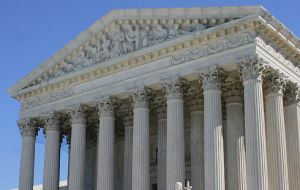MercoPress. South Atlantic News Agency
Argentine defaulted bonds dispute reaches the US Supreme Court
 The US Supreme Court has asked the Obama administration for its view on the case
The US Supreme Court has asked the Obama administration for its view on the case The US Supreme Court has asked President Barack Obama's administration for its views of a ruling that unfroze 105 million dollars of Argentina's central bank deposits in a setback for two US investment funds that sought to seize the money to satisfy their claims from Argentina’s debt default a decade ago.
At issue in the case was a ruling by a federal appeals court in New York that US law shielded the property of a foreign central bank used for traditional central banking activities, regardless of whether the bank was independent from its parent state.
The appeals court ruled the freeze must be lifted because of limits under a US law, the Foreign Sovereign Immunities Act of 1976, on the ability of Argentina's creditors to freeze or seize assets. It said the central bank and Argentina did not waive its immunity.
The disputed deposits had been frozen since 2006 and held at the US Federal Reserve Bank in New York. The case was part of the long-running litigation in New York over Argentina's 100 billion dollars default.
The two funds, EM Ltd and NML Capital Ltd, appealed to the Supreme Court. Argentina and its central bank opposed the appeal. They said the appeals court was correct and it had adopted the position advocated by the US government.
The Supreme Court in a brief order asked Solicitor General Donald Verrilli to file a brief expressing the US government's views in the case. The filing of the brief could take months. The court then will decide whether to hear the appeal.
In April 2010 Federal New York court Judge Thomas Griesa ruled that the Argentine government controlled the Central bank and had committed “fraud and an act of injustice” on refusing to pay the defaulted bonds and therefore the plaintiffs should be compensated with Argentine central bank funds held at the NY Federal Reserve.
However in August 2011 an appeals court threw out the sentence arguing that the shares of the Argentine central bank continue to be protected by law and did not enter the discussion whether the bank was an independent entity or not.




Top Comments
Disclaimer & comment rules-

-

-

Read all commentsHere is the real interesting matter.How global capitalism penetrates sovereignty by osmosis.Who is right or wrong here isn't the real matter of interest,it's how states are subjected by default,to the laws of capitalism creating it's preferred conditions.The national state no longer exists,it is a phantom,I think.
Jan 18th, 2012 - 11:29 am 0I agree, it's a very interesting case. Although it is not over sovereignty it is fraud. If CFK didn't use the BCRA reserves to pay some debts but not others there wouldn't be a case but alas she did. The question is, will she be able to get away with it?
Jan 18th, 2012 - 01:55 pm 0If Argentina loses they will have to pay the full 6B or some negotiated figure or risk losing all ability to use U$ for trade, confiscation of IDB loans, WB loans, etc and most likely the Swiss would impound the funds that are on deposit with them.
@2
Jan 21st, 2012 - 05:57 pm 0Let's hope it turns out that Argentina loses: they need a real world lesson to deflate their ego.
This time the money is already in the bank and just needs to be distributed to the creditors at long last.
I hate and detest fraudsters or any nationality.
Commenting for this story is now closed.
If you have a Facebook account, become a fan and comment on our Facebook Page!